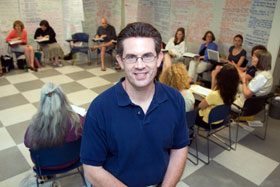  |
| HOME | THIS ISSUE | CALENDAR | GRANTS | BACK ISSUES | < BACK | NEXT > |
Summer institute helps Connecticut educators teach writingby Cindy Weiss - September 10, 2007 | ||||
| For 25 summers, teachers from around Connecticut have come to UConn to learn how to teach writing. They attend the Connecticut Writing Project’s Summer Institute, four weeks of graduate-level study of composition and creative writing. When they leave, they can act as teacher-consultants, training other teachers as well as their own students in the art and skills of writing. The Connecticut Writing Project at UConn, part of the College of Liberal Arts and Sciences, was one of the nation’s first writing projects, says Jason Courtmanche, its new director. There are now some 160 around the country, including three in Connecticut – at UConn, Fairfield University, and Central Connecticut State University. The Connecticut Writing Project at UConn receives federal support along with funding from the College of Liberal Arts and Sciences, the English Department, and the Aetna Chair of Writing. Courtmanche, who earned his bachelor’s degree in English at UConn in 1991 and completed his Ph.D. here last winter, brings first-hand experience to his new job. For 12 years, he taught English at RHAM High School in Hebron. He has also previously been co-director of the Connecticut Writing Project and an adjunct professor here. For his master’s degree at Humboldt State University in California, he studied composition. Now, as director of the Connecticut Writing Project, he teaches a course that he once took as a student: “Advanced Composition for Prospective Teachers.” Most of the participants in the Connecticut Writing Project’s summer institute are high school teachers, although the program is open to practicing teachers at any level K-12. They study composition theory and creative writing, and they each develop a research-based workshop on writing that they can present to other teachers. They also develop a portfolio of their own writing. The ripple effect of the institute makes it a powerful tool to improve student writing, says Lynn Bloom, Aetna Chair of Writing and Board of Trustees Distinguished Professor of English.
“These teachers go back to their home schools and other schools to give workshops to their peers on the basis of what they have learned in the summer,” she says. Since 1988, when the Aetna Chair – the first endowed chair at UConn – began supporting the summer institute, about 400 teachers have attended, but as many as 250,000 in Connecticut and surrounding states have benefited from the ripple effect, “to say nothing of their students,” Bloom says. One premise of the project is to empower teachers to write creatively themselves. Some teachers don’t think of themselves as writers, Courtmanche notes. “The idea is, they’ve got to be writers and learn their craft in order to teach others,” he says. With $25,000 or more annual support from the Aetna Chair, the 20 or so teachers who are fellows of the summer institute earn graduate credits toward their master’s or sixth-year degree, or they can take a stipend for their work. Throughout the school year, the Connecticut Writing Project provides professional development for teachers on their in-service days and at the Storrs campus on Saturday mornings. Every other year, it sponsors a student and teacher writing conference; and it publishes a magazine of student writing each year. This summer’s institute attracted teachers from schools that included Wilbur Cross High School in New Haven; Weaver High School in Hartford; Glastonbury High School; and elementary and middle schools in Mansfield, Pawcatuck, and New London. This year’s co-facilitator of the institute, along with Courtmanche, was Kelly Andrews-Babcock, a kindergarten teacher at Killingly Memorial School. Among the workshops that this year’s participants will take back to their home schools are a poetry slam, using drama and acting in the classroom, and how to combine music and student writing. |
| ADVANCE HOME UCONN HOME |

